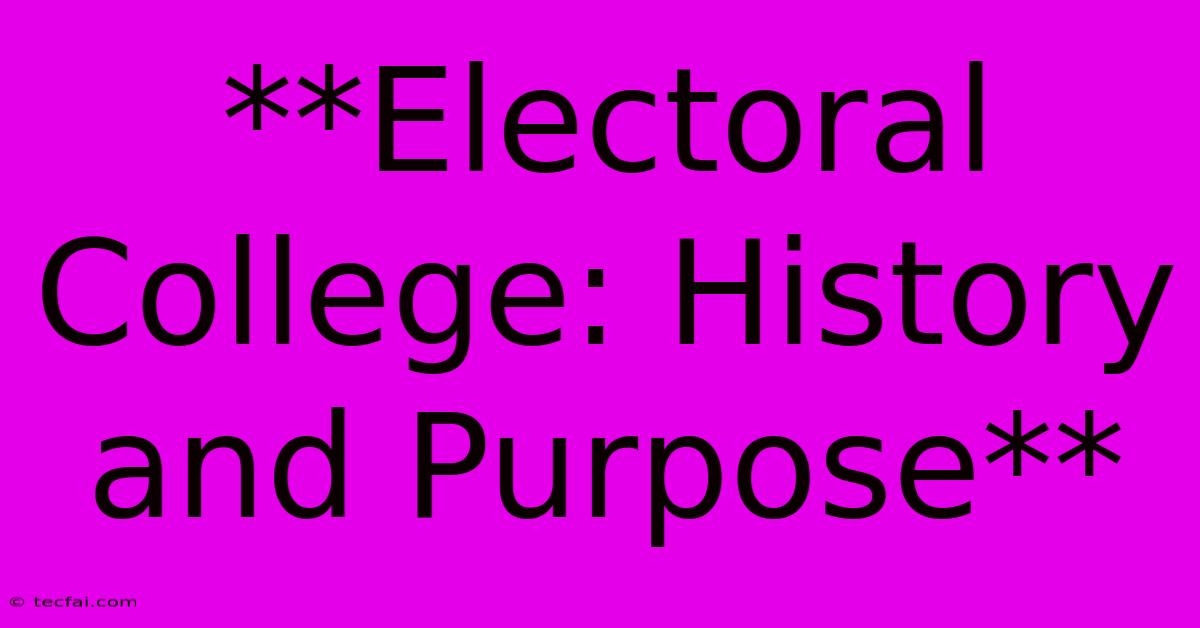**Electoral College: History And Purpose**

Discover more detailed and exciting information on our website. Click the link below to start your adventure: Visit Best Website tecfai.com. Don't miss out!
Table of Contents
The Electoral College: A History and Purpose Explained
The Electoral College, a unique feature of the United States presidential election system, has been the subject of much debate and discussion for decades. While it may seem like a complicated and antiquated system, it has its roots in the founding of the nation and serves a specific purpose. This article will delve into the history and purpose of the Electoral College, exploring its origins, its intended role, and the ongoing debate surrounding its continued use.
Origins and Historical Context
The Electoral College was established by the Founding Fathers as part of the United States Constitution, specifically outlined in Article II, Section 1. It was a compromise reached during the Constitutional Convention, balancing the interests of large and small states.
Why an Electoral College?
- Fear of Direct Democracy: The Founding Fathers were wary of a direct democracy where the candidate with the most popular votes would win. They feared that large states with bigger populations would hold undue influence over smaller states.
- Ensuring Representation of All States: The Electoral College system guarantees that each state, regardless of population size, has a voice in the presidential election. Each state is allocated a number of electors based on its total congressional representation (House of Representatives and Senate).
- Promoting Compromise: The Electoral College encourages candidates to appeal to a diverse range of voters, not just those concentrated in large urban areas. This can lead to a more balanced and moderate approach to campaigning and policy.
How the Electoral College Works
The Electoral College system is a complex process. Here’s a simplified explanation:
- Electors: Each state is assigned a number of electors equal to its total number of representatives and senators in Congress. For example, California, with 55 representatives and two senators, has 57 electors.
- Popular Vote: On Election Day, voters cast their ballots for the presidential candidate of their choice. However, the actual vote that determines the winner is the electoral vote, not the popular vote.
- Electoral Vote: The candidate who wins the popular vote in a state typically receives all of that state’s electoral votes, with the exception of Maine and Nebraska, which use a proportional system.
- Winning the Presidency: The candidate who receives at least 270 electoral votes (a majority) wins the presidency. If no candidate reaches this threshold, the election is decided by the House of Representatives.
Arguments for and Against the Electoral College
The Electoral College remains a subject of ongoing debate. Its supporters argue that it:
- Preserves Federalism: The Electoral College system encourages candidates to campaign across the entire country, not just in densely populated areas.
- Protects the Interests of Small States: It ensures that smaller states with fewer electoral votes still have a voice in the election.
- Promotes National Unity: It forces candidates to appeal to a wide range of voters and regions, fostering a sense of national unity.
However, critics argue that the Electoral College:
- Undermines the Principle of “One Person, One Vote”: A candidate can win the presidency without winning the popular vote, as has happened five times in U.S. history.
- Favors Larger States: While it guarantees representation for small states, it also gives disproportionate power to larger states with a higher number of electoral votes.
- Discourages Voter Turnout: In some states, voters may feel their vote doesn't matter since their state's outcome is predictable, leading to lower voter turnout.
Conclusion: The Future of the Electoral College
The debate surrounding the Electoral College is likely to continue for years to come. Whether it remains as the cornerstone of the U.S. presidential election system or is eventually replaced by a more direct form of voting is a question that will continue to be debated and re-examined. The Electoral College, despite its complexities and criticisms, remains a fundamental part of the American political landscape, and understanding its history and purpose is essential for informed participation in the democratic process.

Thank you for visiting our website wich cover about **Electoral College: History And Purpose**. We hope the information provided has been useful to you. Feel free to contact us if you have any questions or need further assistance. See you next time and dont miss to bookmark.
Featured Posts
-
Body Double Voting Melania Trump Election
Nov 06, 2024
-
Trump Musk Election Night Watch Party
Nov 06, 2024
-
Jill Steins Impact On 2024 Us Election
Nov 06, 2024
-
Jason Kelce Issues Apology For Fan Phone Incident
Nov 06, 2024
-
Reducing Weather Impact With Tech
Nov 06, 2024
